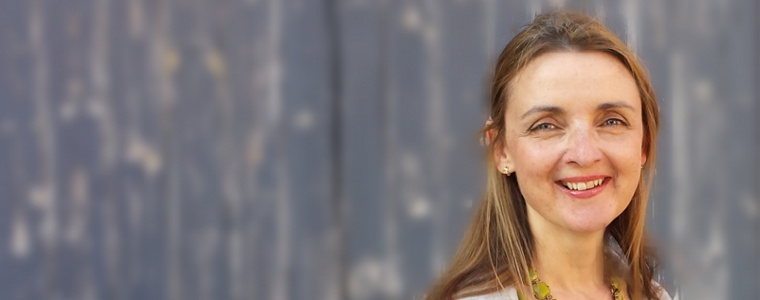
Michelle's experience of what it was like to try out being a nun, and what the sisters taught that is beneficial to us all.
Have you ever wondered what makes people want to be part of a community of nuns and/or monks? Why would anyone want to prioritise prayer when there is so much work to do?
These were questions I used to ask myself. Then I found that I was being drawn towards trying it out for myself, despite being the most unlikely candidate for a life involving silence and stillness.
I did try out being a nun, and in a community I learned lessons from the sisters about how to search for life's purpose, the necessity for tolerating difference, and what it is like to have a life that puts prayer and trusting in God first. Although at first I was doing less achievement-focused work, eventually I came to see that nuns do not lead a life that is inactive, but learn to pray first in order to prioritise what matters most. In doing so, they live a life of prayer and service that is more fulfilling than it otherwise might be.
My first encounter with a nun took place because I wanted to learn to pray better. I had an intuitive sense that, if God was asking us to commune with him, there ought to be more to it than awkward silences, lists and obligations. Shouldn't prayer be a natural and fulfilling part of our relationship with God? I had never met a nun before, but I reasoned that since they have dedicated their lives to prayer they would have some answers to my questions.
This blog post is about my first lesson in prayer.
Wanting to pray
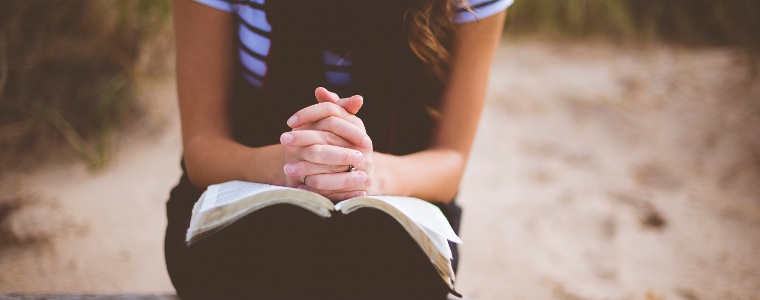
At the age of 19, I heard Suzette Hattingh from the Christ for All Nations ministry give a sermon on the importance of prayer. Her loud passionate preaching was a shock to me, and though I found her style difficult I sensed her authenticity. At the end of the Pentecostal-style meeting I found myself on my feet committing my life to prayer.
The next day back in my small student digs, I did my best with my prayer list. But I sensed that there was more to prayer than a bunch of requests. I also felt drawn to pray quietly, but I didn't know how. I am by nature talkative and not at all quiet or serene, so this struck me as strange.
Being still, when you aren't

I asked my vicar at that time how to pray. He is a lovely man, who said I might like to try lighting a candle and sitting quietly waiting on the Lord. He confessed that he couldn't give more advice than that, because he 'wasn't very good at it'.
I tried. I lit a candle and sat and prayed. I waited for a minute or so and nothing happened. I tried to 'be still', which was unsuccessful since my mind wandered. After about five minutes I concluded that praying quietly with a candle 'didn't work'. Patience wasn't my strong point! However, I still wanted to find out more about praying and so sought more advice.
Visiting the nuns on the Common
Knocking at the door
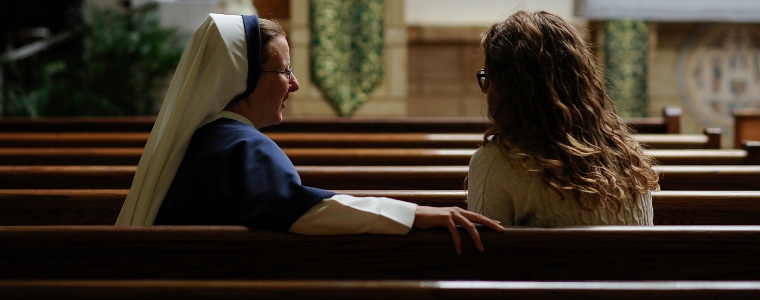
I knew I needed more help to learn to pray. I also knew there were some nuns living on Clapham Common in London, who provided something called 'spiritual direction'. One of my friends regularly visited a sister and I had teased her about how 'spiritual direction' sounds a bit weird. (In spite of this, I found out later that spiritual direction is not someone giving you direction, but a Christian friend who helps you to discover what God may be doing in your life and encourages you to follow that, and someone you can talk to about the realities of learning to pray or failing to pray.)
I decided to go ask the nuns on Clapham Common to teach me how to pray. It took several 'fly pasts' before I had the courage to ring the doorbell. The door was opened by a nun, wearing a full length habit, who seemed friendly enough. I asked without preamble for a spiritual director. The sister asked, 'Do you have anyone particular in mind, or will I do?' I said that she would do and was invited in for a cup of tea and a chat. That was the beginning of a friendship which lasted for 25 years, until Sister's death.
I explained to the sister about my inability to pray. She suggested not doing anything extra for a while – abandon all candles – and just notice the times, however fleeting, when I did pray. She said, 'My guess is you pray more than you think you do.'
In time, as I began to notice more about prayer as a way of deepening a relationship with God, I began to make more connections between daily life and faith. I began to see how prayer permeates the whole of life because it is one of the main ways we discover more about ourselves and more about truth. It's the whole of a Christian life that matters, not just segments of it, so the sister also asked about the whole, not just the specific times of concentrated prayer. In thinking about the whole of life I began to question just what I was supposed to be doing with my life.
Life's purpose
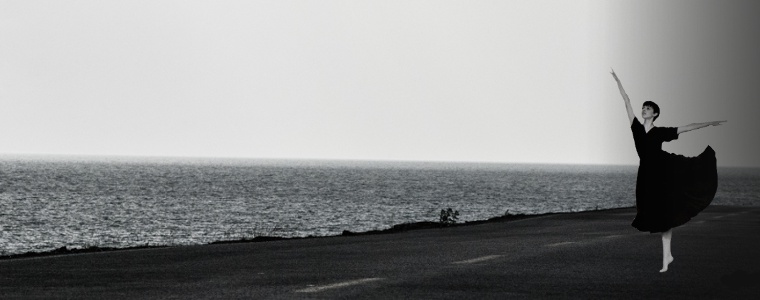
I became a Christian when I was a dance student, studying at the Royal Academy of Dance in London. Until that point, I'd taken it for granted that I would train to dance, dance professionally if I could, and teach as well. But I had a gnawing sense that I should be doing something with my dancing to more specifically glorify God. I also heard people talking about having a sense of calling, and wondered what God might have in store for me.
For a very few people it seems simple. They hear an audible voice, or even in the case of Moses see a burning bush that speaks. If I had a call like that it would seem much simpler. Instead, like most people I listened but couldn't hear anything direct or obvious. So what do we do when we don't know what God is saying? Or is it something to do with the quality of our listening?
What is my calling?

The word for calling is linked to vocation and voice. In Christian circles, discernment of whether or not you have a vocation is often linked to a specific ministry, service or even the religious life. This is unfortunate. If we are all made in God's image, and we all have a purpose, however humble, then we all have a call, or a work to which we are especially suited. John Otberg explores calling in his book If You Want to Walk on Water You've Got to Get Out of the Boat:
'A calling is not something you discover, not something you choose. The word vocation comes from the Latin word for voice. Discovering involves carefully listening.'
Ortberg, 2001
I therefore continued for some years with my sense of vocation to be a dancer. I joined Springs Dance Company, where the love of dance is expressed in a way that aims to glorify God. It was a wonderful company to be part of, because it was small enough that I had the opportunity to choreograph and teach as well as to dance. I discovered that my strong suit was choreography.
Springs dancers are still among my best friends and the company has gone from strength to strength, but for me there was still a sense that there was something missing, and a desire to more fully pursue a life of prayer.
It was during my time studying a postgraduate course at London Contemporary Dance School that I made my first retreat to St Mary's Convent, Wantage, UK. I was blown away by the focus of the community that lived there, of a life lived for prayer and Christian service. I had no idea at the time that the nuns on Clapham Common were actually a branch house of St Mary's, Wantage. I had not made the connection or even discussed my decision to go on retreat with the sister who was my spiritual director.
As I stayed in a place that seemed alive with prayer, the idea of living in community was planted. And once I'd got the idea, try as I might, I couldn't ignore the sense that I had a vocation to be in community. Gradually, the desire to test my vocation became stronger.
How do I know if I'm called?
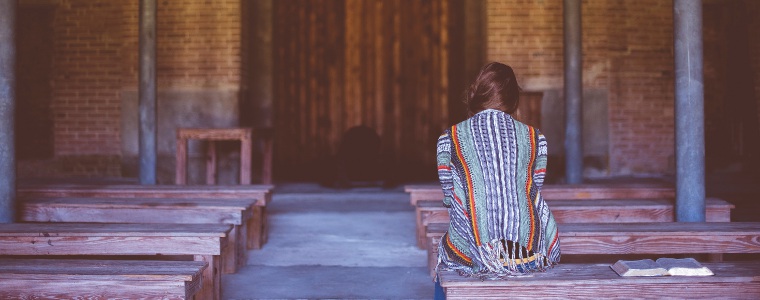
When I was a novice/trainee in community I heard a seminar by Martin L Smith, an Anglican Monk. He said that discerning a vocation was not simply a matter of praying to God, and looking in his Holy-Filing-Cabinet-on-High for the file with your name on it so that he can tell you what to do! It's more a question of peeling back the layers of what we have become, to find our God-given heart's desires. Thomas Merton put it this way,
'Discovering vocation does not mean scrambling toward some prize just beyond my reach but accepting the treasure of true self I already possess. Vocation does not come from a voice out there calling me to be something I am not. It comes from a voice in here calling me to be the person I was born to be, to fulfil the original selfhood given me at birth by God.'
Thomas Merton
So with some disbelief I decided to test my vocation the religious life, which is the formal way of saying to try out being a nun.
Entering the Convent
I entered the Community of St Mary the Virgin in Wantage in 1993. I'd had a series of interviews and stayed a few times, and the Reverend Mother at the time had concluded that I'd better give it a try, since that's the only way to be sure of a vocation.
I was surprised, when I entered the convent, to discover that not every trainee was like me! I assumed that I had a calling to be there for the rest of my life. It seemed likely, therefore, that the seven other novices would have a similar outlook on life and faith. How wrong I was! It now seems laughable to think that all those entering a convent would have a similar perspective. I learned much from the oh-so-different others in the novitiate – some lessons I learned at the time, and others I'm only now beginning to appreciate.
Some lessons from my experience of the Convent
Tolerating difference is necessary for growth

I entered the Community of St Mary the Virgin as a 25-year-old Anglican and found myself in a novitiate with seven others, all of whom were very different from each other. In fact, we were polar opposites; conservative evangelicals, evangelicals, Anglo-Catholics, traditionalists, and thankfully a few moderate Christians. What, I asked myself, was God thinking in gathering together those who were so different?
What's more, the nuns did nothing about it! They accepted each person as they were. We were not told what to believe. In practice, this meant that two novices with entirely different perspectives sat next to each other in chapel, one reading Everyday with Jesus by Selwyn Hughes, providing a 'sound' evangelical theology, and the other one preferring St John of the Cross, a Christian mystic. How could such difference co-exist in any kind of harmony? Shouldn't the sisters intervene and 'correct' the novices so we all thought in the same way?
What happened, in time, was that we learned to accept each other, and that living side-by-side with people we had not chosen – and who had not chosen us! – meant really learning about forgiveness in practice. Before I went into community, I thought I got on well with people. After a few weeks I realised that I got on with most people and avoided the ones I didn't like. And since I couldn't avoid anyone in the convent this presented me with a challenge! I had to face that some of what I didn't like was actually a reflection of my own imperfections. As one of the sisters said: 'What we least like in others is when in them we see our own faults.' I also came to see that some of those with the most strongly held views were not necessarily the strongest people, and they too were striving to live an authentic Christian life.
Some of the Wantage sisters had spent many years living in India and so had much experience of diverse ways of living and cultural difference. I remember in the novitiate having a debate about the 'rightness' or otherwise of different forms of prayer. I remember one of the particularly discerning sisters saying, 'But none of us is big enough to know the whole truth.'
For me this acceptance of others is at the heart of the gospel message of Christianity, because the early Christians broke bread together, lived together, shared all they had, and were known for their love for one another. They were not all the same – they came from different backgrounds and sometimes had difficulty getting on with each other – but they stuck with it. This is what the sisters are working on when they live together. They're not a holy huddle of people who think the same as each other and float around praying all day, but the opposite: a community of people united by a desire to follow Jesus, who learn to love each other just how they are.
Now as I reflect on the differences of those of us in the novitiate, I can see parallels with the differences of Christians in various denominations of the church. So the challenges we faced in loving one another, really noticing how God is working in the lives of others that are different from us in the novitiate, was in some ways a prayer for the whole of the church as it tries to demonstrate the love that Christ has for each of us.
I learned then that difference is good for us. Learning to accept those who are different is what makes for peace, at a micro level. And perhaps being at peace with those we live with – our near neighbours – helps us pray with more integrity for global peace.
Forgiveness and reconciliation

Since leaving the Wantage community, I have come to realise that living with people that you haven't chosen, and may not even always like, has a value far greater than I appreciated at the time. I now believe, with hindsight, that embracing difference is at the heart of the gospel, because it is a necessary part of loving each other as Christ loves us. In Archbishop Justin Welby's biography, 'reconciliation' is described as living together in peace without ending disagreement. It seems to me this is what the nuns were asking us to do in the novitiate. One section of the biography is about the Archbishop's earlier work for reconciliation in war zones, which he undertook when employed by the International Centre for Reconciliation:
'Welby drew an important distinction between reconciliation and arbitration or mediation. Its purpose was not to resolve conflict or end disagreement, but to enable warring parties "to continue to disagree without violence or mutual destruction". He observed that reconciliation was "at the very heart of the gospel", demonstrated supremely in the cross of Christ which brought sinners into a relationship with God.'
Andrew Atherstone
Obviously the Archbishop was working in war zones – more extreme conditions than the convent! But the principles are the same for nuns, as well as us wherever we find ourselves. We may be working with people we haven't chosen, worshipping with people with whom we don't always agree, and living in neighbourhoods with people we don't always like.
The challenge is how to be true to ourselves and to profoundly respect other people; to learn to listen to them and to learn to love them. Jesus simply told us to love one another as the Father loves us. Reconciliation through the cross is the way to this kind of love. The challenge goes on.
So if we need to respect others and their faith and interpretations of prayer, does that mean anything goes?
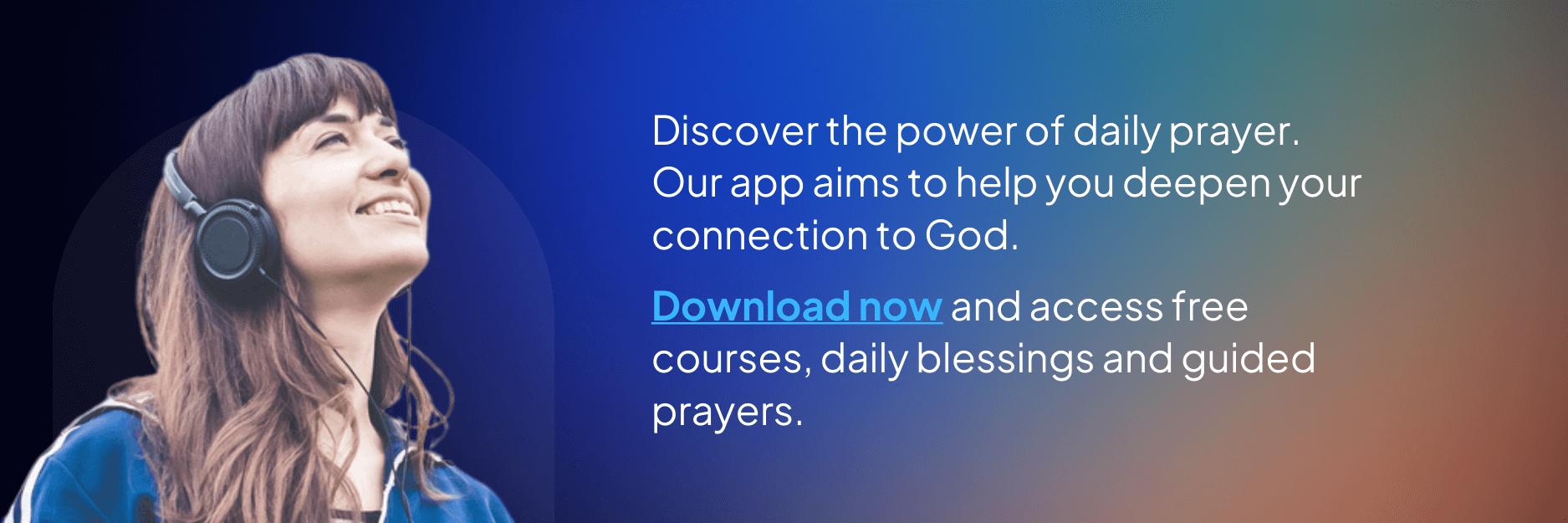
The dangers (or perceived dangers) of meditation for Christians
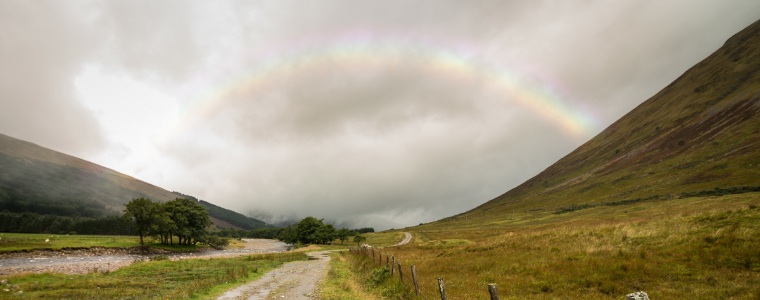
Whilst I believe there is a great range of types of prayer, I don't think that any-old-way will do. St Paul says that 'everything is permissible, but not everything is beneficial' under God's provision of grace (see 1 Corinthians 10:23). So how can we know if we are on track with our prayer, especially with meditation, and not accidentally following a path that might lead us to harm?
In the novitiate I did a lot of thinking about the 'rightness' or otherwise of silent forms of prayer. I had been taught to be wary, perhaps even fearful of 'meditation', since meditation might expose my mind to unseen dark forces or altered mental states that could be harmful. I had heard some teaching that Christian meditation was about filling your mind, and other forms of meditation were about emptying your mind. This did nothing to allay my fears, since 'filling your mind' seemed like brain-washing!
When I tried asking the nuns about whether or not Christian meditation was healthy, one of them said that the evil we should fear most is that which is already within us. Another said that we would go, or 'live' I suppose, in the direction that we are praying. The second thought was a bit cryptic, and not all together helpful at the time.
What allayed my fears in the end was simply reading about Christian meditation. First, Judeo-Christian meditation is an ancient practice that's been around for thousands of years and is first mentioned in the story of Isaac in the first book of the Bible (Genesis 24:63). It is not one form of prayer, but several. For example, we might still our minds at the beginning of a meditation in the same way we might clear our desk before beginning to write a blog post. The aim of this form is to put aside distractions and focus on God. We might repeat a passage of the Bible or say it very slowly, as a form of meditation to allow the passage to sink in. We may allow silence in our prayer times for adoration, thankfulness, or rejoicing so that God can get a word in edgeways. These are all simple forms of meditation. They are not higher forms of prayer, or lower forms of prayer, just examples of prayer.
I think we have a job to do, to judge wisely what is best and to learn from the ancient paths. The Bible forms the basis of this wise judgement for Christians. It is more than a set of rules, but contains hundreds of examples of the way in which God communicates with people and the ways in which people respond in prayer. The ways that are described in the Old and New Testaments of the Bible all have the potential to lead us towards a good relationship with God: prayer, petition (asking God for things), intercession (praying for other people), fasting and praying, praying in tongues, to name just a few.
Living a balanced life
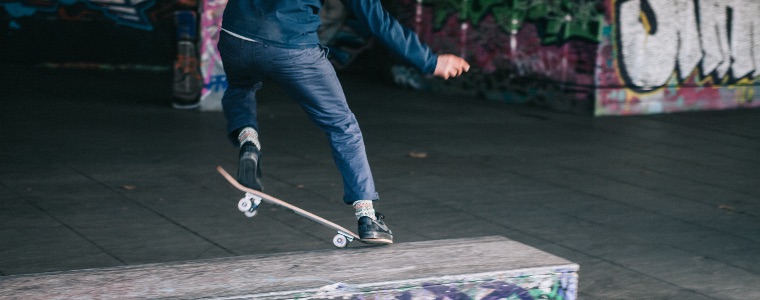
The life that monks and nuns live aims to be balanced and holistic. At St Mary's Convent the day is divided into several parts, including time for work, time for prayer, time for reading Christian books, time for rest and recreation, and time for eating! Part of what monks and nuns do is to say the 'daily office'. This is like a series of church services.
At Wantage there are five offices each day. Offices comprise singing scripture together and praying, and involve the singing of large chunks of the Psalms. The offices are beautiful, especially when using the old plainchant (see below for an example of the music), but I was initially baffled at the idea of spending so much time in corporate prayer.
I was especially baffled because prayer seemed to get in the way of other good work like helping in the retreat centre, pastoral work, and cooking. When the bell went for an office, we were tasked with gently winding up what we were doing and heading for the church. Sometimes it felt like good work was being 'interrupted' by corporate prayer. I once asked the novice guardian if the offices could be optional if you were busy doing some other good work. She looked a bit aghast and said that the offices were the primary work of community and definitely not optional. It took me time to understand why.
Corporate meditation on scripture is a solid foundation for life
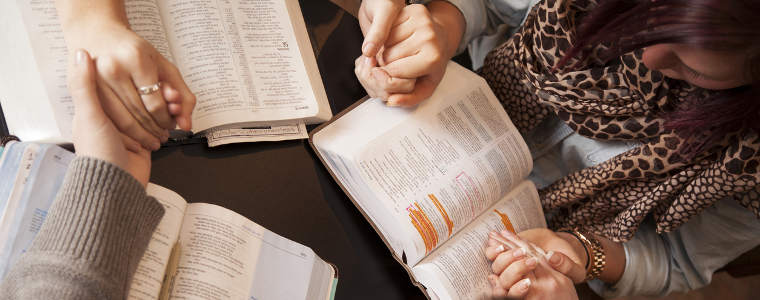
There are three points I found helpful in understanding why nuns and monks go to church what feels like every five minutes:
- The first is that corporate prayer is the most important thing that they do. They might not always be able to see the results immediately, but the fruit of groups of people praying is borne out in the lives of those they pray for. Additionally, the constant prayer provides a kind of scaffolding for the thousands of people each year who make a retreat at a religious community.
- Secondly, offices are a kind of meditation on the Bible, so scripture encases everything monks and nuns do in the day. There is a freedom and a safety in this, because all other activity and prayer is 'held' in scripture. The office ensures that Christian faith is the anchor for the life and work of each member of the community.
- Finally, if you say the office often enough you begin to remember large tracts of the Bible, and various Bible verses pop into your head during the day. I believe that when we learn scripture it begins to take root in us and shape us. The prophet Isaiah talked about God's attitude to work and the way scripture can shape us like this:
'I don't think the way you think.
The way you work isn't the way I work.'
God's Decree.
'For as the sky soars high above earth,
so the way I work surpasses the way you work,
and the way I think is beyond the way you think.
Just as rain and snow descend from the skies
and don't go back until they've watered the earth,
Doing their work of making things grow and blossom,
producing seed for farmers and food for the hungry,
So will the words that come out of my mouth
not come back empty-handed
They'll do the work I sent them to do,
they'll complete the assignment I gave them.'Isaiah 55:8-11 (The Message)
Monastic life can teach us a lot about how to balance our lives
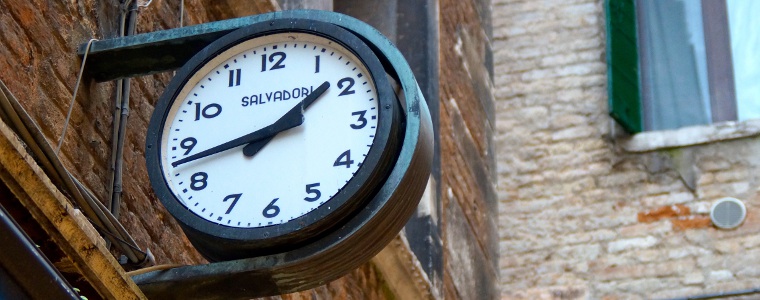
Most of us struggle to find a balance between work and rest, let alone time to pray. In the western world we have often lost faith in God as sovereign. This shows itself in our thinking that we have to make everything happen ourselves, and working ourselves harder and harder. The trouble is that our hard work often ends in exhaustion. My Christian friends and my friends of other faiths or none all seem to have a similar struggle with finding this balance.
In religious communities people have to stop what they are doing, even in the middle of something worthy, to go and say office. This means that they have to accept their own limitations. In a strange way this is liberating, because it forces us to recognise that we cannot do everything in our own strength. St Benedict, a 4th century monk, wrote this about the Work of God, the corporate prayer and worship in church:
'As soon as the signal for the time of the divine office is heard, let everyone, leaving whatever he hath in his hands, hasten with all speed, yet with gravity, that there may be no cause for levity. Therefore, let nothing be preferred to the Work of God.'
Rule of Benedict
On reflection, I think what I learned is the value of putting work into a wider context and perspective, and learning to stop when it is time to finish, because we cannot do everything all at once. I wonder also what life would now be like if we did truly prioritise prayer and make it the centre of our lives, not a five minute add-on. It's not that other things aren't important, but more that everything needs to be kept in its place: we are created beings in a divine order. The Old Testament puts it like this:
For everything there is a season, and a time for every matter under heaven:
a time to be born, and a time to die;
a time to plant, and a time to pluck up what is planted;
a time to kill, and a time to heal;
a time to break down, and a time to build up;
a time to weep, and a time to laugh;
a time to mourn, and a time to dance;
a time to throw away stones, and a time to gather stones together;
a time to embrace, and a time to refrain from embracing;
a time to seek, and a time to lose;
a time to keep, and a time to throw away;
a time to tear, and a time to sew;
a time to keep silence, and a time to speak;
a time to love, and a time to hate;
a time for war, and a time for peace.What gain have the workers from their toil? I have seen the business that God has given to everyone to be busy with. He has made everything suitable for its time; moreover, he has put a sense of past and future into their minds, yet they cannot find out what God has done from the beginning to the end. I know that there is nothing better for them than to be happy and enjoy themselves as long as they live; moreover, it is God’s gift that all should eat and drink and take pleasure in all their toil.
Ecclesiastes 3:1-13 (NRSV)
Final thoughts
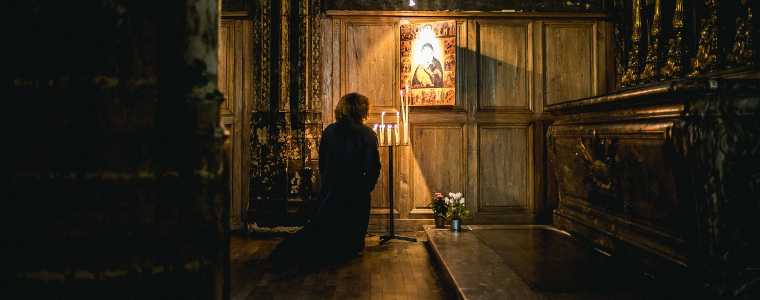
I think this is quite enough of my story for now! I've written these notes mainly because I'd like to share with you the good that's in the life of communities of nuns and monks. Not for the sake of curiosity, but because the way they live has much to offer us now.
I'm grateful to the sisters for all they taught me, in formal teaching and by their example of loving me just as I am:
- Silence is good for us, even if we are naturally talkative
- You can seek out a nun or a monk for conversation and guidance, to help you explore a life with prayer at the centre
- A 'call' from God is basically our deepest heart's desire
- Tolerating difference in each other is necessary for growth, not just for ourselves but for the wider world too
- Meditation can be a simple, helpful and healthy part of a Christian life
- Living a more balanced life is possible, even when there are lots of demands.
There are some fabulous musicians at Wantage and they taught me to really value music as part of my worship and relaxation. Some particularly beautiful religious music was written by St Hildegard of Bingen, an 11th century abbess. If you would like a little time for relaxation in your life right now, here is a taste of Hildegard's music.
I once choreographed a dance to this music for Springs Dance Company – Journey of the Magi – and recently found out that it's still in their repertoire. They really are super dancers if you get the chance to see them.
What next? If you'd like to listen to some free guided prayer times that have helped people to get going and keep going with prayer, find out more about the Discovering Prayer app.

Images by: Andrew Neel, Felix Russel, Anna Dziubinska, Josh Applegate, Jeremy Kai, Brendan Church, Asa Roger, Clem Onojeyhuo, Steven Hill, Joshua Davis at Unsplashed, also from Michelle Eyre and istock.

